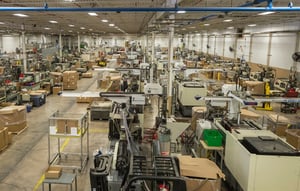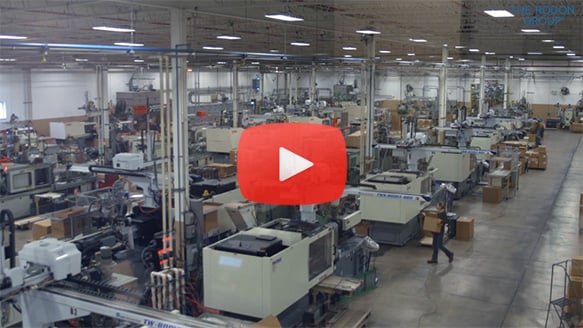Capabilities
Our facility has 125 presses, fully automated and with a full production schedule (24 hours, 7 days a week) during most of the year to maximize efficiency.
Each press is microprocessor-controlled and self-diagnostic, with capacities from fractional to 107 ounces, and clamping force from 46 to 720 tons. Quality control checks of product tolerances, color, and physical appearance are made at every step of the manufacturing process.
Choosing the right injection machine for the job
Before a production mold is ramped-up and running, a sample mold is created to test the cavitation and the resin. This vital step can help avoid costly reworks of an injection mold. If any problems surface, they are addressed before the production mold goes into service.
 Injection machines (presses) come in all shapes, sizes and configurations. The selection of the machine will depend on several variables including the size of the mold, the number of cavities and the selected resin. Our comprehensive Facility List page breaks down the types of presses we have at our facility.
Injection machines (presses) come in all shapes, sizes and configurations. The selection of the machine will depend on several variables including the size of the mold, the number of cavities and the selected resin. Our comprehensive Facility List page breaks down the types of presses we have at our facility.
Plastic injection molding machines are classified or rated based on tonnage, or more specifically the clamping pressure or force. Presses can run in size from less than 5 tons of clamping pressure to over 4000. The higher the press ton rating, the larger the machine.
When the production mold is finalized, and the machine is prepped, manufacturing begins. An initial run will be thoroughly examined for any part defects. If none are found, full production can begin. Depending on the part and the agreement with the molder, quality checks can take place on a regular basis. They will check for strength, color correctness, and any common defects that can occur like flash or warping.
Automation = Efficiency
Now it comes down to inventory. You need to be sure you have the right quantities in the right place at the right time. At Rodon, we keep a safety stock for our clients to ensure we can meet any unseen demands. We also monitor the quantities on hand, in real-time, so we can help our clients estimate their future needs.
We utilize an MRP system (Material Requirement Planning system).This tool allows the manufacturing team at Rodon to monitor jobs from the minute they are initiated to the time they are delivered including all of the downstream impacts. Our demand-driven planning allows us to meet the JIT manufacturing needs of our discerning clients. Rodon’s manufacturing team’s experience with cycle times, resin properties, and part demand has resulted in a 99.8% satisfaction rating.
Interested in learning more about what sets us apart from the competition?
Ready to get started? Request a Quote










